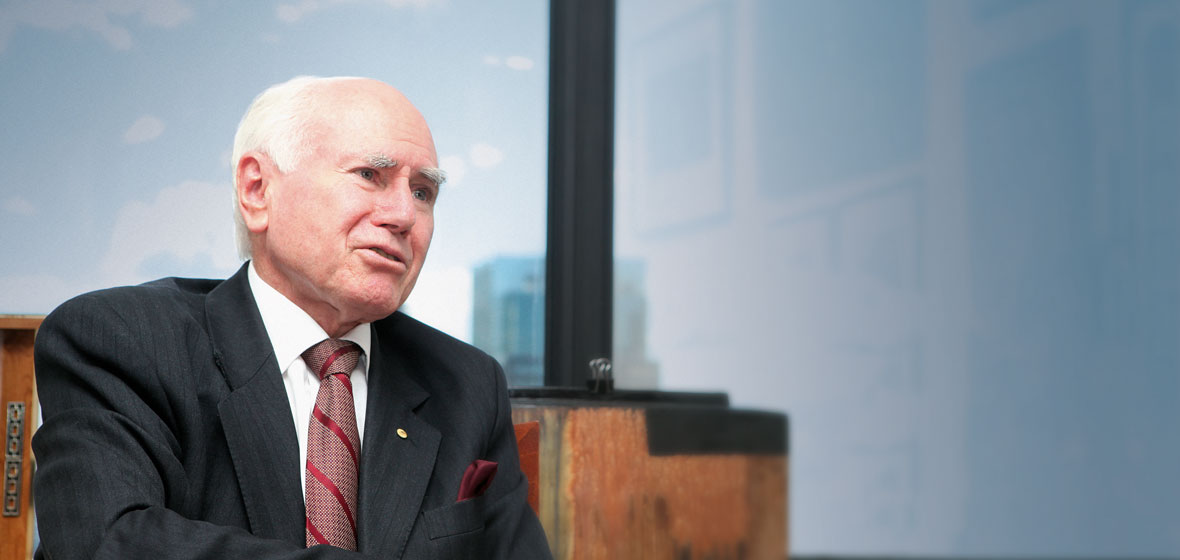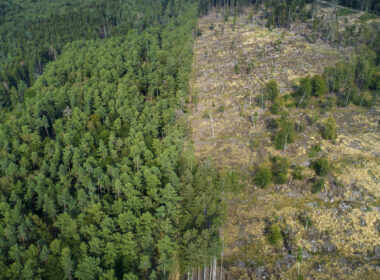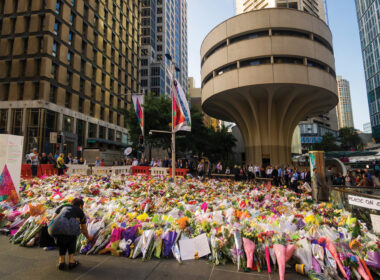On the eve of the Battle of Mont St Quentin, Private Lyall Howard of the Australian Imperial Force’s 3rd Division inscribed four words in his small, standard issue diary for 30 August, 1918.
It was an entry as economical as it was remarkable. There, on the wasteland of the Western Front, as five divisions under the command of then Lieutenant-General John Monash, were forming to take the seemingly impregnable Mont St Quentin hilltop fortress in what historian Les Carlyon called “probably the finest thing Australians did in the Great War”, a father and son would run into one another amidst some of the most traumatic conditions imaginable. Lyall’s entry simply read: “Met Dad at Cléry”.
“Dad was like that,” says Lyall’s son, former Prime Minister John Howard. “He wasn’t a wordy person. He spoke in a very laconic fashion.” In his city office above Sydney’s CBD, adorned with sporting keepsakes and views across Circular Quay, Howard is dressed crisply in a suit and tie and speaks without fuss about growing up in Sydney’s inner west.
Politics was a constant topic of conversation, he says, but less so was his father’s time at the front. “He didn’t talk a great deal about his experiences in the war,” says Howard.
“A little bit, but not a great deal. It was a horrible war – any war is horrible – but the slaughter in that war was terrible. That generation was encouraged to forget it, to move on.”
Lyall’s father, Walter, had enlisted in July 1917, at the age of 44, leaving behind a wife and eight children. He joined the AIF forces that his eldest son had signed up to as a 19-year-old in January 1916. Both would fight on the Western Front under Monash, and both would return. Walter was evacuated after being wounded in the stomach just days after meeting his son at Cléry, while Lyall ingested mustard gas in Passchendaele and would suffer chronic bronchitis after the war.
“Most families had been touched in some way,” says Howard. “Even if they hadn’t suffered a loss, men came home without their sight or had lost a leg or, as in my father’s case, ingested mustard gas. You were aware they were involved and you were aware – from what they said and what you read – that it had been awful.”
As was common to many serviceman’s families, Howard knew of the diary his father had kept, along with memorabilia that included copies of postcards Howard’s father sent to his mother, French greeting cards, and his medals. When Howard visited Cléry in 2000, he says he “naturally felt some connection with the place as my father and grandfather had been there many years earlier and in such historically traumatic circumstances”.
Howard has recently reflected on what his father and grandfather went through. “There are millions of Australians who are just like me,” he says. “We’re proud of what our country did in that war and in later military operations. I think we should have a common respect for people who put their lives on the line to defend our country, no matter what the theatre of operation is.
“I often used to say that there’s no hierarchy of sacrifice for Australia’s war dead. They should all be honoured in common.”
For Howard, the efforts of Australians on the Western Front should be elevated in our historical observance of World War I.
“I’m not saying in any way that Gallipoli should be played down – it should always have a special place – but when you look at the proportionate contribution of the Australian forces to the outcome of those decisive battles at the end of 1918, it was quite remarkable,” he says.
When Howard first read the diary, there were still people alive who had served in World War I. Nearly 100 years later, with no remaining serviceman from that campaign, he explains that there has been a subtle shift in the national psyche.
“There’s no doubt that when a country reaches a point where there is nobody left alive who actually participated in the events that are being remembered there’s a very different attitude to the remembrance of those events,” he says. “The interest in the remembrance of them increases rather than decreases, because the nation has passed from a point of history to a point of memory.”
I think we should have a common respect for people who put their lives on the line to defend our country, no matter what the theatre of operation is. I often used to say that there’s no hierarchy of sacrifice for Australia’s war dead. They should all be honoured in common.
JOHN HOWARD OM AC
Howard has long been a student of history. He says he probably made a mistake in not doing an arts degree before he did a law degree and in the last two years of school “was a little bit attracted to journalism at one stage”.
“In the end I decided to do a law degree, in part because of an intuitive interest in it and also because I had an older brother, Stan, who was a solicitor,” he recalls.
When he left school, Stan arranged for his younger brother to work as a messenger boy for a barrister’s clerk at Denman Chambers in Phillip Street. He ran messages and carried books for QCs.
“I was just a general dog’s body,” he says. “But they paid me eight pounds for it, which was a lot of money back then.”
The chambers would also turn out to be profitable in other ways. With characters such as Clive Evatt QC, then Labor leader Bert Evatt, Ken Asprey QC and Sir Gordon Wallace QC using the same chambers, the budding law student’s exposure to a remarkable group of lawyers further kindled his interest in the law. “And,” says Howard, “I used to do the banking for John Kerr. He had a quite a good practice.”
Howard attended law school between 1957 and 1961, graduating in the same class as later Supreme Court judge Terry Cole and Federal Court judge Roger Gyles QC. He was articled to Myer Rosenblum who he describes as “one of the great characters in my life”.
“He played rugby for Australia, held the state hammer throw record, was a wonderful tennis player, was fluent in a number of languages, and played bassoon in the Sydney Conservatorium Orchestra,” Howard says. “He was a very cultivated man and I was very fond of Myer.”
In the smallish office on Old Bond Street, Howard recalls life as an articled clerk spent standing in queues and delivering and filing documents. “It predated the document exchange service,” he says. “I can’t imagine what it would be like now.”
After university, Howard became involved in politics and, by 1964, was leader of the NSW Young Liberals before resigning in July that year for a working holiday in London. After a stint at a firm of solicitors in Ilford, Essex, working at the Stratford Magistrates Court in the East London – “which had an interesting cross-section of humanity” says Howard – he returned a year later via Europe, Israel, India and the US. By 1967 he had won Liberal pre-selection for the seat of Drummoyne, a vote he would lose in the
1968 election by 839 votes.
That year, while still in the Liberal Party’s state executive, Howard formed a partnership that would later become Truman, Nelson and Howard. As he writes in his autobiography, “Although my passion for politics never receded, this was a period when I derived considerable satisfaction from the practice of law.” Howard was responsible for the firm’s litigation, including divorce work that he found less than enjoyable, as well as personal injury cases. In one case he won a payout of $40,000 for an immigrant worker injured on the Snowy Mountains Hydro Electric Scheme.
When he entered parliament in 1974 after winning the seat of Bennelong, Howard remained a partner in the firm until he was made a minister in the Fraser government a year later.
We’ve had a first class judiciary and I have a generally orthodox view of the role of the judiciary. I don’t think parliament should try and circumscribe what it does.
JOHN HOWARD OM AC
While he resigned upon receiving his ministry due to the potential for making decisions that affect commercial interests, Howard is firm in the belief that people should not have to give up their professional activities and associations when they become members of parliament, unless they hold ministerial office.
“I think we overdo that these days,” he says. “It was far better years earlier. Menzies used to take briefs when he was opposition leader and Gough Whitlam appeared in court after he entered parliament. It didn’t make them any less effective or didn’t corrupt them. We’re just stupid about that stuff now. You end up having a lot of whitebread people who don’t have too much experience of life.”
Working as a solicitor gave Howard a number of critical skills. The law taught him to focus on using the process wisely. It was also important that he needed to constantly do things and get things done.
One of the most invaluable traits he developed for life as a parliamentarian was the ability, as he puts it, to “clear paper”.
“That may seem very hum drum, but solicitors can’t succeed if they can’t keep on top of their files and papers,” he says. “In my opinion, you can’t be a successful minister if you don’t have the capacity to clear paper. You don’t want to be preoccupied with clearing paper, but if you find a minister who can’t keep their desk clean, can’t deal with things as they come, and can’t prioritise, they normally end up a failure because the routine becomes urgent.”
Howard says that as a minister, 90 per cent or more of the advice that comes from a department is unexceptional, sensible advice that should be taken and executed immediately.
“It’s that other 10 per cent that matters,” he says. “That’s what should engage you. But if you can’t handle the other 90 per cent, then it starts to go ripe on you.”
There was one other piece of advice from his law days that Howard carried with him through political life.
“I remember a partner in a law firm once telling me that what you had to do was ‘to kill a matter’,” he says. “That always stuck with me. What he meant was that you would sometimes have a transaction that would go sour because, while the main part of it was completed, some loose ends were not tied up. So you had to nail everything down, make sure all the obligations were discharged, and you had to do all of that expeditiously. You had to kill it off.”
Howard says that sometimes the same can be true of political decisions. “The original decision can be fine,” he says, “but because the aftermath is not well executed, it can go bad. I don’t want to overstretch that, but it’s something I found helpful.”
The former Prime Minister, who has just written a book on Robert Menzies called The Menzies Era, still keeps a keen eye on legal issues. But one topic animates him more than others: the debate around a Bill of Rights.
“I don’t think we’ll ever have a Bill of Rights in Australia and I hope we never do,” he says. “There are three things that keep Australia democratic: a vigorous parliamentary system, a free and skeptical press, and an incorruptible judiciary that administers laws in a fair and effective manner. If you have all of those things, I think you’ll survive.”
“I think we’ve been very lucky that over the years our judiciary has been very good,” he adds. “There have been plenty of decisions that I’ve disagreed with and that’s life. But in the main we’ve had a first class judiciary and I have a generally orthodox view of the role of the judiciary. I don’t think parliament should try and circumscribe what it does.
“The problem with a Bill of Rights is that it hands too much power to unelected people. I respect the judiciary in its chosen field, but I am totally opposed to parliament handing over power to unelected judges to determine things that should be determined by people through their elected representatives. I think the American Bill of Rights is a terrible system.”
Howard still enthuses about his time in public life and is still actively engaged by the cut and thrust of current debates.
“I had a great time in Parliament,” he says. “I enjoyed politics and I’m still very interested in it. I talk about it sparingly because I don’t think it’s my role as a former Prime Minister to give a day-to-day commentary on what the government’s doing, and I haven’t done that. I’ve adjusted and so you should. And, anyway, if you get to 75 and you’re living in Australia, what have you got to complain about?”




